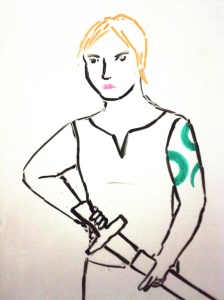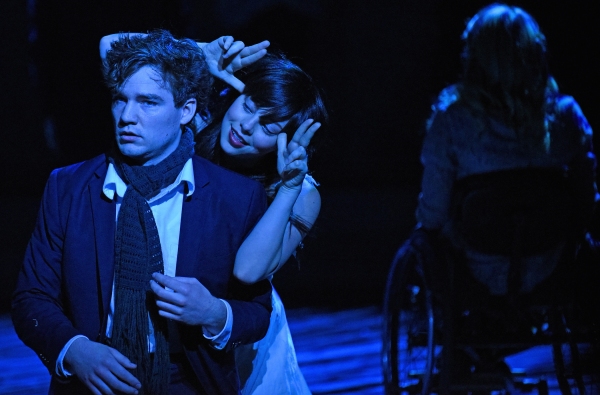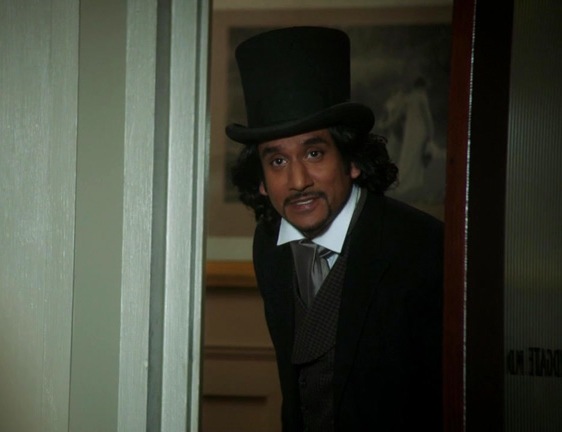The following entry may contain triggering material.
Last week, I was walking to work when it occurred to me how much warmer the weather was than when I usually walk to work. Like, the start of sweltering, which ought to be a season; maybe the other could be chilling. The personifications of time, that I consciously decided ought to be a thing about two years ago…for the most part have gone nowhere fast. I thought they’d be everywhere once I started being open to noticing them.
Captain Marigold does seem to come clearer around this time. I’d come to association the bright, hot, dry days with her. She’d crossed over sometime during the -ber months of 2014, though—I’d thought her up originally as a fanfiction character, like if Captain Hook had to contend with some cross between Pirate Queen Granuaile and Pirate Queen Alfhild. More pirates ought to be women. I was so smug that I knew the difference between mythopoeia and theophany, and then Marigold punched through my precious worldview. Since last year’s Sweltering season, she’s been overseeing the projectile part of my etheric weapons training.

At knifepoint.
And part of that was conjuring up images of corporeal offline people I hate enough to never, ever, ever want to see again, not even in imagination. Going full-on no-contact and avoidance had been infinitely valuable to recovering from them, even if I could never personally get a hang of repression. And Marigold wanted to bring them up.

“But it’s not going to do anything,” I’d reasoned to Marigold, and pointed across the grassy field. “These aren’t their real souls. Look, they lurch around like undead. It’s just images of them that I thought up because you’d asked me to.”
And the thing about spiritwork as an imaginary interface is, I guess it’s if I’ve had too much of some kind of Vitamin B, what’s imagined is vivid enough to have the same texture as the spirit world. Most people who’ve attempted blank mind meditations might have noticed an internal chatter that originates internally but isn’t within their control; and the same goes for some unforced daydreams, so the appearance of autonomy could very well be just that, appearance.
“Anything I thought I was doing before on this plane that made for wishcraft could be headspace stuff,” I realized. “A while back, I’d read of one witch that cast curses, but also added that conjuring up a duplicate of someone you hate so as to have at them was safe and a valid form of inner work to get over it…what if it’s always the latter?” I might be mildly embarrassed if that were the case, having kept a wishcraft blog for three years or so, but I’d really rather know.
Marigold didn’t sigh or smile. She only said, “Are you going to overthink it, as you always do, or are you going to start shooting?” She wasn’t being Socratically ironic in that question, she was being rhetorical.

AT KNIFEPOINT.
Actually, that’s a gladius.
Pirates. The last time I’d tried to bring up a serious topic to have a real conversation about metaphysics with Foxglove, he’d rolled his eyes and jumped right overboard. But I later described these training sessions to him as ‘a very lenient level of personal hell’ and I think he knows better than I do what Captain Marigold is like. I catch a glimpse of them both in the same space sometimes, and get the sense that they’ve been affable nemises since before I was born.
*
Since then, I’d been re-reading Joan Chodorow’s compilation of Jung On Active Imagination more slowly and carefully. Dangers to engaging in Active Imagination without the guidance of an analyst included getting caught in a sterile circle of one’s own complexes, or aesthetic phantasmagoria by which nothing of value is gained.
The forefather of modern psychology brought in a great deal of baggage. The way I’d heard it told, Sigmund Freud’s first protege was Alfred Adler, who I’d heard and read next to nothing about despite Adler possibly having stumbled upon a bridge between some of the more prominent ideologies in contemporary Western thought: kyriarchy and individualism. Freud had a very specific and rigid idea about sexual repression being the source of so many mental disorders. When Adler, who was supposed to be Freud’s younger duplicate (according to Freud), went up to Freud all like, “Hey, Papa Sig…I married this nice Russian anti-capitalist feminist lady and she has a lot of good ideas about societal conditioning that I want to adopt into the psychoanalytical framework we’re making, you know, broadening the scope outside of sexual repression could be insightfu—” But Freud’s eyes began to glow and wreathes of flames erupted from between his teeth as he shouted, “ADLER YOU ARE DEAD TO ME.” And Adler beat a hasty retreat. But because I’d read so little of Adler, I can’t speak to how traumatizing that might have been.
After Carl Jung proposed religious systems of symbolism as a possible alternative, Papa Sig’s eyes again glowed and he breathed fire between, “JUNG YOU ARE DEAD TO ME” and Jung fell into a bleak depression after the breakup. The experiments with self-treatment, that Jung began during that time, grew to define his career.
I found myself amused reading of one daydream of Jung’s in which he found himself on a battlefield, with Sigmund Freud riding a chariot down a mountain towards them. A comrade-in-arms of Jung in this fantasy, described as a “brown-skinned savage”, hurled a weapon at their enemy, it met its mark and imaginary Sigmund Freud fell imaginarily dead.
Another version of their falling-out that I’d read of involved Freud psychoanalyzing Jung and coming to the conclusion that Jung was conspiring against Freud, and Freud believed that action must be taken in accordance with that—even though, especially as, that impulse Freud “found” in Jung must have been entirely subconscious. I imagine Jung trying to convince himself that Freud’s entire framework was not, and had never been, real or right at all in any measure—a way to protect and purify oneself against emotional abuse, and recover oneself. Freud got everyone pegged wrong, some forefather of psychology that is—how preposterous that Freud would find any fibre of disloyalty in someone who admired him as much as Jung—
And yet, there Jung stood in the daydream of a battlefield, and there imaginary Sigmund Freud lay imaginarily dead as though Jung’s subconscious were trying to tell him something. The way Jung interpreted it was this: though this imaginary corpse borrowed Freud’s face, the archetype was that of the patriarchal warrior, and while having a mentor figure had helped Jung to mature, it was time for that notion to “die” and for Jung to finally grow up into his own prestige. (Especially as the same archetype allegedly remained very much alive in pre-Second-World-War collective psyches…and created Nazis. I’d read it as fitting, then, that the personage to deal the killing blow in Jung’s mindscape was dark and “savage” although I haven’t read more on Jung’s analysis and relationship to this comrade-in-arms yet.) I read it as the chariot-riding archetype was too pure to be human (so no human can become an archetype unless they are repressing a lot), and too different from Jung by nature even then for Jung to ever have a hope of growing up into the doppelganger of Freud that Freud seemed to have expected of his proteges. (Hi, Adler.)
*
Archery lessons were a massive bore, to go through and to write about. Still, eventually, gradually, I started to feel better. Marigold and the sessions became gradually less vivid. I still don’t have a bow of my own. The imaginary inanimate object remains very opinionated as it explodes randomly into arrows (randomly, except when I’ve borrowed Marigold’s bow.) Lately, Marigold’s been back around, but hasn’t bossed me around to do much. Will follow where this leads; not to be an ingrate, but Marigold never struck me as the type to show up or do anything just because (though I’d never personally had to pay any tithes yet, nor have I borne witness to any of her plans coming to fruition. Maybe it’s too big or on a need-to-know basis.)








